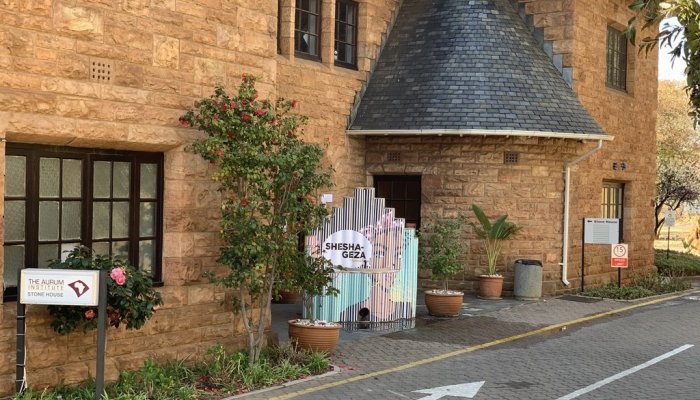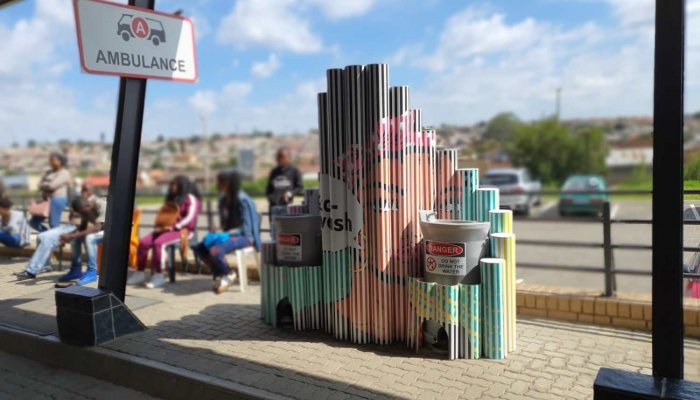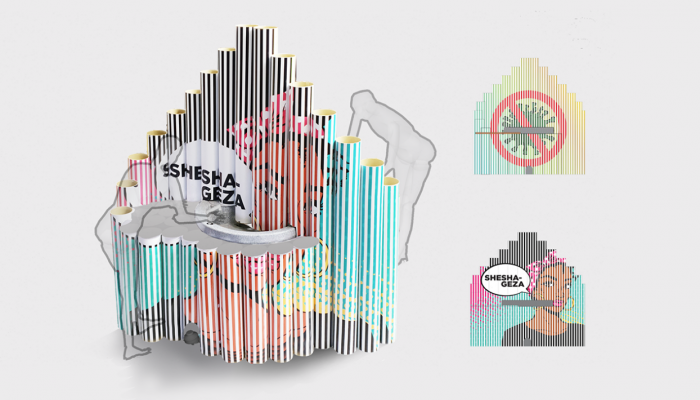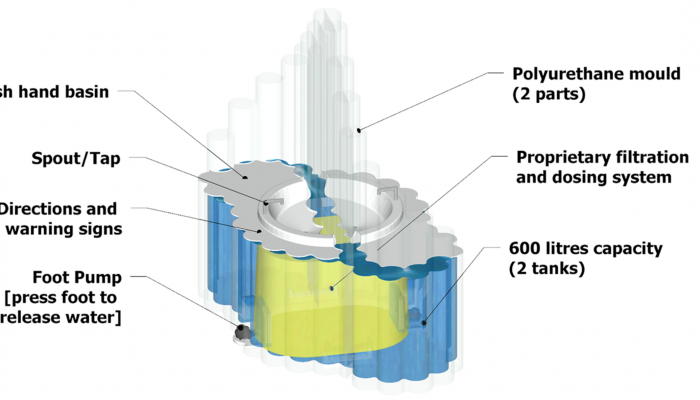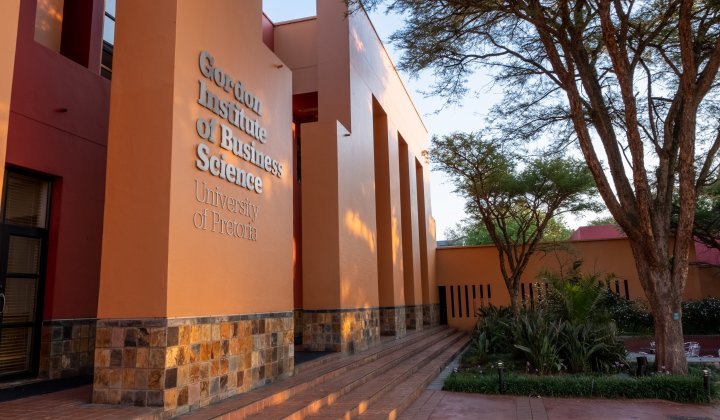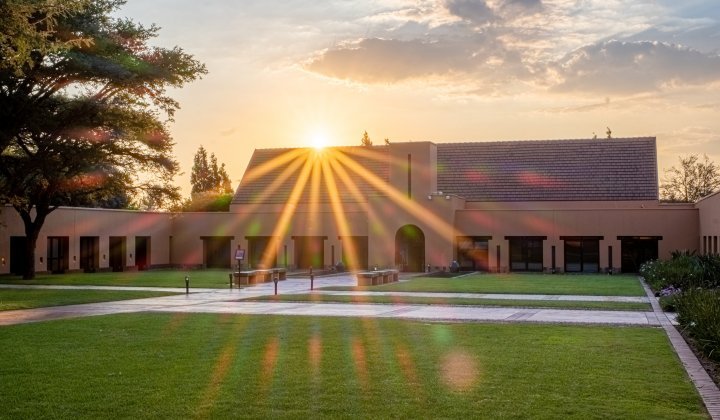Architect and designer, Dean Boniface, believed from the start that using diluted chlorine-based hand sanitiser solutions would prove to be more expedient, cost-effective and sustainable in the long term. He had a vision of creating a low-cost, robust handwashing station that could be used in commuter hubs and other high-traffic areas throughout the continent, not just to help stop the spread of Covid-19, but to improve sanitation facilities beyond the pandemic, too.
He developed the Shesha Geza (‘Hurry up and wash’ in isiZulu), which uses a specialised filtration system to provide a mobile and cost-effective solution to combating the challenge of hand sanitisation. His brother, Roger Boniface, MBA lecturer at GIBS and Executive Director of EDISIM Business Simulations, joined him to help manage the business and explore its potential. “We wanted to establish a wash handbasin that could use water and filter it, but the places where we wanted to distribute these too often don’t have access to running water or proper drainage,” says Roger. “There’s nothing novel about a wash handbasin, but we were looking to create a solution where we could filter the water and make sure that it's still safe for people to wash and that it combats all the different diseases and bacteria.”
The result, the Shesha Geza, is a mobile handwashing station operated by a foot-pump to reduce the need to touch taps. The basin is set into a polyurethane mould that allows for 12m2 of advertising space. “Each basin has been designed and branded by Henk Erasmus, a branding specialist at G. le Roux Pad printers,” says Boniface. “If you see them, you can see the mastery of his work."
Chlorine, not alcohol
The two tanks have a capacity of 600 litres, enabling approximately 4,000 hand washes per cycle, and the water can be used safely for a minimum of five cycles using a proprietary filtration mechanism. This means the Shesha Geza allows for more than 20,000 hand washes before needing to be refilled. It can be set up wherever it’s needed most and moved to respond to changing requirements.
“The World Health Organization (WHO) indicates that the chlorine-based solution is effective against the novel coronavirus, and other viruses that may live on human hands,” explains Boniface. “This solution requires significantly less water, maintenance and costs. It also allows for the use of hand soap and water as an alternative, if preferred.”
The unit has also been designed as a shared value branding initiative, providing potential sponsors with the opportunity to be part of the hand sanitisation solution while sending a positive message to the community using the unit. “The Shesha Geza allows the private sector to become part of the solution, promoting their brands directly to their target audience. The revenue generated aims to assist with maintenance costs, creating a sustainable business model. If we can get companies to brand a washbasin instead of spending money on a billboard, they can get their brand awareness out there while servicing the community and making a meaningful impact,” says Boniface. “Now, we just have to raise the awareness of it.”
The Shesha Geza is ideal for transport hubs, outside clinics and schools, and even more remote sites, like mines. It’s been developed in line with guidance from the US Centers for Disease Control and Prevention (CDC) South Africa and received funding from the US President’s Emergency Plan for AIDS Relief (PEPFAR) and its partner, The Aurum Institute (Aurum).
The next step in the evolution of the Shesha Geza is including an option for an Internet of Things (IoT) monitoring device, which monitors the chlorine and water levels (along with 19 other parameters) for safety and to cut down on maintenance checks. This, Boniface says, will ensure the budget applied by the CDC can reach a much larger audience.
Fast-growing
Within three months of operation, Shegeza (the name of the company supplying the Shesha Geza basins) reached an order book of over R7 million and was shipping out between 40 and 50 basins per week. At the time of writing, the company had just taken on four interns from the GIBS Postgraduate Diploma in Business Administration (PDBA) programme to provide extra sets of hands to help with finalising the business model and maintenance plans and evaluate partnership offers. The company was aiming to have between 250 and 300 washbasins delivered to various locations throughout Gauteng, Western Cape and North West by mid-September.
“I don’t know what this product will look like a year from now,” says Boniface. “We’re looking into kids’ washbasins and exploring the idea of developing a programme around the importance of hand sanitisation, not just around Covid-19, but for preventing the spread all sorts of other bacteria and diseases, from Ebola to listeriosis. We have the very talented and creative Kaylee Serra in our team, who continues to come up with unique solutions, so I am excited to see what the future holds.”
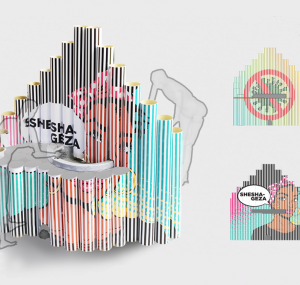
Shegeza was also in the process of shipping 10 units to West Africa for a pilot programme sponsored by Endeavour Mining Corporation. “They’re putting two outside the airport in Abidjan and the other eight at a variety of locations to show their support to the community. As health and safety are paramount on mine sites, they will now have a solution for miners and their communities in the middle of nowhere so that they can have a better option to continuously practice effective hand sanitisation,” says Boniface. “This basin is robust, and we’re hoping that people will see that it’s an African solution designed for use in Africa. You can plug it in, and anyone can use it. You don't need to have the IoT of things. For example, if this went into a rural location someplace in the Eastern Cape, you could follow the instructions on the basin, and you could add cups of chlorine from it from an HTH bucket. People could just use a chlorine strip to monitor it every so often and dump the old water and fill it with new water when required. It's not a sophisticated solution in terms of its maintenance.”
Shegeza is also investigating making a mould of the Shesha Geza to allow for a poured concrete version of the basin, which will make it into a more permanent structure that can be created on a specific site. This will also alleviate any concerns around the theft of the units.
“We’re looking to partner with organisations to sponsor and brand the hand washbasins – companies who want to send a positive message to vulnerable communities and help to make an impact,” says Boniface. “It’s a chance to be part of the hand sanitisation solution.”
See the Shesha Geza in action on YouTube.
For more information, visit www.shegeza.co.za or email welcome@shegeza.co.za.


